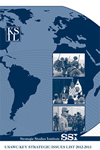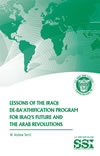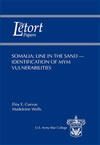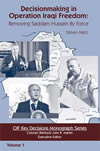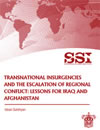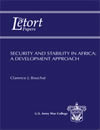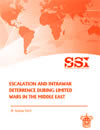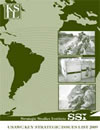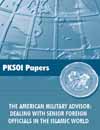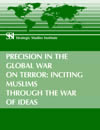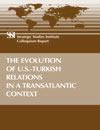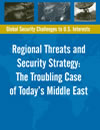Middle East & North Africa - Recent
Research on the Middle East and North Africa focuses on three central areas. These are (1) US-Middle Eastern strategic cooperation and conflict, (2) the role and importance of political Islam in the region, and (3) insurgency and terrorism both in and emanating from the region as well as ways to address these problems. Dr. Andrew Terrill is our Middle East and North Africa specialist.
New References from the Military Education Research Library Network
Syria: Congressional Hearing on Human Rights
(9/30/11) A Congressional hearing on U.S. human rights policy toward Iran and Syria. (View it at NDU)
Syria: Congressional Hearing on Human Rights
(9/30/11) A Congressional hearing on U.S. human rights policy toward Iran and Syria. (View it at NDU)
Saudi Arabia: NSC Statement on Reforms
(9/30/11) A statement from the National Security Council on women's voting rights in Saudi Arabia. (View it at NDU)
Saudi Arabia: NSC Statement on Reforms
(9/30/11) A statement from the National Security Council on women's voting rights in Saudi Arabia. (View it at NDU)
-
Added September 19, 2012
The Prospects for Security Sector Reform in Tunisia: A Year After the Revolution
Authored by Dr. Querine Hanlon.
The Arab Spring began in Tunisia, and in the year since the revolution, Tunisia has undergone a remarkable transition to democratic rule. The legacy of the previous regime looms large, however, as Tunisia’s new government faces major challenges implementing Security Sector Reform. -
Added September 17, 2012
Hidden Dragon, Crouching Lion: How China's Advance in Africa is Underestimated and Africa's Potential Underappreciated
Authored by David E. Brown.
In 2010, China eclipsed the United States as Africa’s largest trading partner. Beijing has accomplished this by using a tied aid, trade, and development finance strategy to promote its commercial and political interests on the continent, and its status as a rising global power. This monograph examines the origins of China’s rapid economic advance in Africa; whether this advance will help or hurt Africa; and, the implications that this ecomomic advance will have for the United States. -
Added August 01, 2012
Against All Odds: Relations between NATO and the MENA Region
Authored by Dr. Florence Gaub.
Whereas NATO had no relationships with the Middle East and North Africa at all until 1994, it has expanded now to an extent where the League of Arab States mandated its Libya mission in 2011. This monograph explains this unlikely development. -
Added August 01, 2012
2012-13 Key Strategic Issues List
Edited by Dr. Antulio J. Echevarria, II.
The purpose of the Key Strategic Issues List is to provide military and civilian researchers a ready reference for issues of special interest to the Department of the Army and the Department of Defense. -
Added May 01, 2012
Lessons of the Iraqi De-Ba'athification Program for Iraq's Future and the Arab Revolutions
Authored by Dr. W. Andrew Terrill.
This monograph considers both the future of Iraq and the differences and similarities between events in Iraq and the Arab Spring states. Serious and expanding mistakes by new governments are possible in the aftermath of the Arab Spring revolutions, and any lessons that can be gleaned from earlier conflicts will be of considerable value to those nations. Moreover, U.S. Army officers and senior noncommissioned officers (NCOs) may often have unique opportunities and unique credibility to offer advice on the lessons of Iraq to their counterparts in some of the Arab Spring nations. -
Added March 14, 2012
Delegitimizing Al-Qaeda: A Jihad-Realist Approach
Authored by Dr. Paul Kamolnick.
Preventing radicalization and recruitment to al-Qaeda’s terrorism is vital to U.S. national security. This monograph suggests a distinct “jihad-realist” approach for partially accomplishing this elusive strategic objective. -
Added December 08, 2011
The Saudi-Iranian Rivalry and the Future of Middle East Security
Authored by Dr. W. Andrew Terrill.
Saudi Arabia and Iran have often behaved as serious rivals for influence in the Middle East and especially the Gulf area since at least Iran’s 1979 Islamic Revolution. While both nations define themselves as Islamic, the differences between their foreign policies could hardly be more dramatic. Recently, the rivalry between Riyadh and Tehran has intensified and been reflected in their policies involving a number of regional states including Iraq, Lebanon, Syria, Egypt, Yemen, Bahrain, and others. -
Added September 30, 2011
Presidential Succession Scenarios in Egypt and Their Impact on U.S.-Egyptian Strategic Relations
Authored by Gregory Aftandilian.
This monograph explores the critical question of who might succeed President Hosni Mubarak by examining various succession scenarios in Egypt. Given the extensive political, security, and economic ties between the United States and Egypt, the monograph also examines the policy implications of each of these scenarios and makes recommendations for U.S. policymakers. -
Added May 19, 2011
Rebuilding Armed Forces: Learning from Iraq and Lebanon
Authored by Dr. Florence Gaub.
Learning from the armed forces of Iraq and Lebanon might not seem the first instinct when it comes to improving post-conflict reconstruction efforts. Yet, the two cases offer useful insight into these processes, what to avoid and what to emphasize. -
Added March 09, 2011
India in Africa: Implications of an Emerging Power for AFRICOM and U.S. Strategy
Authored by Dr. J. Peter Pham.
Little attention has been given to the fact that India is fast becoming one of Africa’s most important partners, not just in the economic realm but also in the political and security sectors. The author argues that, in the context of the broader U.S.-India strategic partnership as well as America’s specific interests in Africa, the United States should welcome India’s contributions to and engage with India on the African continent. -
Added January 27, 2011
The Conflicts in Yemen and U.S. National Security
Authored by Dr. W. Andrew Terrill.
Yemen is not currently a failed state, but it is experiencing huge political and economic problems that can have a direct impact on U.S. interests in the region. More recently, Yemen has also emerged as one of the most important theaters for the struggle against al-Qaeda. Under these circumstances, advancing U.S. interests by helping the Yemenis is a major foreign policy challenge that must be addressed by U.S. strategic leaders. -
Added November 02, 2010
America's Most Committed Muslim Ally
Authored by Dr. W. Andrew Terrill.
Each month a member of the SSI faculty writes an editorial for our monthly newsletter. This is the Op-Ed for the November 2010 newsletter. -
Added September 23, 2010
Preparing for One War and Getting Another?
Authored by Dr. Antulio J. Echevarria, II.
The idea that war or strategy is driven by a paradoxical logic is attractive, but a number of questions remain unanswered. If war has its own logic, rather than its own grammar, where does the logic of policy fit in? If the logic of strategy is paradoxical, how can it be taught? What are paradoxes, and can they be useful in guiding our strategic choices? -
Added September 09, 2010
Somalia: Line in the Sand--Identification of MYM Vulnerabilities
Authored by LTC Eloy E. Cuevas, Madeleine Wells.
Continuing instability in Somalia has increased concern that terrorists who seek to establish a foothold in Africa may use such insecure places as a safe haven and launching pad for future attacks. Several attempts have been made to establish lawful governments in Somalia; however, warlord and clan interests have managed to take center stage among the population. The Somali-based al-Shabaab (also known as the Mujahidin Youth Movement [MYM]) is a militant organization born out of both successive regional turmoil and international salafi-jihadi ideology, which continues to actively undermine the United Nations (UN)-supported African Union (AU) peacekeeping force, the fledging Somali Transitional Federal Government (TFG), and all UN efforts to support Somalis in creating a stable state. -
Added May 17, 2010
Sufism in Northern Nigeria: A Force for Counter-Radicalization?
Authored by Dr. Jonathan N. C. Hill.
This monograph examines the roles played by the Qadiriyya and Tijaniyya Sufi Brotherhoods in countering Islamic radicalism in northern Nigeria. -
Added May 06, 2010
Decisionmaking In Operation IRAQI FREEDOM: The Strategic Shift of 2007
Authored by Dr. Steven Metz.
Was the 2007 decision to surge forces into Iraq effective in turning the war from a potential disaster to a possible success? -
Added April 23, 2010
Shades of CORDS in the Kush: The False Hope of "Unity of Effort" in American Counterinsurgency
Authored by Mr. Henry Nuzum.
Counterinsurgency (COIN) requires an integrated military, political, and economic program best developed by teams that field both civilians and soldiers. This Paper describes the benefits that unity of command at every level would bring to the American war in Afghanistan. -
Added April 16, 2010
The Construction of Liberal Democracy: The Role of Civil-Military Institutions in State and Nation-Building in West Germany and South Africa
Authored by Dr. Jack J. Porter.
West Germany’s and South Africa’s experiences remind U.S. policymakers of the tremendous obstacles and challenges that confront states as they attempt to install liberal, democratic political institutions. -
Added April 14, 2010
The State-Owned Enterprise as a Vehicle for Stability
Authored by Dr. Neil Efird.
State-owned enterprises affect stability in conflict-prone environments, and decisive control of them creates positive or negative conditions. However, it is a challenge to know how and when to use these enterprises, and a good set of metrics is necessary to measure their effectiveness. -
Added April 08, 2010
Thinking about Nuclear Power in Post-Saddam Iraq
Authored by Dr. Norman Cigar.
Iraqis are debating the desirability of atomic power for their country. U.S. and international policymakers will have to consider Iraqi views as they shape policy to manage the process of an orderly, safe, and peaceful nuclear reintegration of Iraq in the civilian sector while guaranteeing safeguards against both accidents and any future diversion of a nuclear program for military purposes or terrorist exploitation. -
Added March 26, 2010
Synchronizing U.S. Government Efforts toward Collaborative Health Care Policymaking in Iraq
Authored by Lieutenant Colonel Thomas S. Bundt.
A primary catalyst in achieving our strategic ends in Iraq is through the formulation of a consolidated and cooperative strategic health care policy to enable the successful operation of the Iraqi health care system. An often-cited criticism of U.S. policy, however, is that after the end of major hostilities and transition into stabilization operations, we fall short in post-conflict planning and execution. This analysis highlights some of these operational deficiencies, and it provides recommendations for achieving a more coordinated, functional, and thereby synchronous strategic health care policy. These proposals will enable the U.S. Government (USG) to address health policy operations in stabilization and transitional phase contexts currently and in the future. -
Added March 22, 2010
Decisionmaking in Operation IRAQI FREEDOM: Removing Saddam Hussein by Force
Authored by Dr. Steven Metz. Edited by Professor John R. Martin.
The Strategic Studies Institute (SSI) is pleased to initiate its latest monograph series, Operation IRAQI FREEDOM Key Decisions. SSI started this project in an effort to give leaders of the U.S. Armed Forces some important insights into how military advice was provided to the Nation’s civilian leadership during the many years—including the months before the invasion—of the war in Iraq. Dr. Metz starts this series with an impressive review of the decision to remove Saddam Hussein by force. The Strategic Studies Institute hopes that this and the succeeding monographs will generate debate on just how the United States made decisions—some of them disastrous—about Iraq. The resulting better understanding of the decisions should lead to strengthening of the processes—where appropriate—so that the military and civilian leadership forge better decisions in the future. -
Added March 04, 2010
Transnational Insurgencies and the Escalation of Regional Conflict: Lessons for Iraq and Afghanistan
Authored by Dr Idean Salehyan.
Transnational insurgencies complicate traditional counterinsurgency operations in significant ways and can lead to conflict between states. This monograph examines several transnational militant groups, assesses the prospects for conflict and cooperation over cross-border violence, and discusses current issues facing Iraq and Afghanistan. -
Added February 17, 2010
Do Oil Exports Fuel Defense Spending?
Authored by Dr. Clayton K. S. Chun.
Rising oil prices facilitate the acquisition of greater resources and perhaps economic development. But oil revenues can also drive a government to finance massive military equipment purchases like Saudi Arabia did in 1979. The nature of governments that rely on raw material extraction and long-term development of military programs may affect how their current and future spending occurs regardless of oil prices. How nations decide to use their national wealth helps explain some of the perennial problems facing oil and commodity exporting nations and provides insights into their relations with other countries. -
Added January 22, 2010
Security and Stability in Africa: A Development Approach
Authored by Lieutenant Colonel Clarence J. Bouchat (USAF, Ret.).
The security and stability of Africa has recently become an important national issue. However, to be effective this growing interest must be rooted in the desire to overcome centuries of ignorance and misunderstanding about the conditions and people of Africa. -
Added September 24, 2009
Iraq: Strategic Reconciliation, Targeting, and Key Leader Engagement
Authored by Captain Jeanne F. Hull.
Military commanders and diplomats in Iraq and Afghanistan have been meeting with important local officials since the inception of those conflicts. These engagements have aided commanders and diplomats alike in furthering their objectives by establishing productive relationships with those who know and understand Iraq’s complex human terrain best—the Iraqis. However, these engagements frequently take place on ad-hoc bases and are rarely incorporated into other counterinsurgency operations and strategies. In some cases, unit commanders fail to see the utility of using these engagements at all--an oversight that contributes to deteriorating security situations and loss of popular support. -
Added September 16, 2009
Russian Elite Image of Iran: From the Late Soviet Era to the Present
Authored by Dr. Dmitry Shlapentokh.
Increasing numbers of Russian intellectuals became disenchanted with the West, particularly after the end of the USSR, and looked for alternative geopolitical alliances. The Muslim world, with Iran at the center, became one of the possible alternatives. -
Added September 16, 2009
Baghdad ER--Revisited
Authored by Colonel Erin P Edgar.
The China Dragons of the 28th Combat Support Hospital deployed in support of Operation IRAQI FREEDOM from September 2006 until November 2007. Their service epitomizes the strides that have been made in military combat medicine. -
Added September 16, 2009
Escalation and Intrawar Deterrence During Limited Wars in the Middle East
Authored by Dr. W. Andrew Terrill.
This monograph seeks to analyze military escalation and intrawar deterrence by examining two key wars where these concepts became especially relevant—the 1973 Arab-Israeli War and the 1991 Gulf War against Iraq. A central conclusion of this monograph is that intrawar deterrence is an inherently fragile concept, and that the nonuse of weapons of mass destruction in both wars was the result of a number of positive factors that may not be repeated in future conflicts. -
Added August 26, 2009
Criminals, Militias, and Insurgents: Organized Crime in Iraq
Authored by Dr. Phil Williams.
Criminal enterprises and activities had a debilitating impact and made the attainment of U.S. objectives in Iraq much more difficult. Organized crime inhibited reconstruction and development and became a major obstacle to state-building; the insurgency was strengthened and sustained by criminal activities; sectarian conflict was funded by criminal activities and motivated by the desire to control criminal markets; and more traditional criminal enterprises created pervasive insecurity through kidnapping and extortion. Organized crime also acted as an economic and political spoiler in an oil industry expected to be the dynamo for growth and reconstruction in post Ba’athist Iraq. -
Added July 02, 2009
Pakistan - The Most Dangerous Place in the World
Authored by Dr. Larry P. Goodson.
Each month a member of the SSI faculty writes an editorial for our monthly newsletter. This is the Op-Ed for the July 2009 newsletter. -
Added June 25, 2009
2009 Key Strategic Issues List
Edited by Dr. Antulio J. Echevarria, II.
The purpose of the Key Strategic Issues List is to provide military and civilian researchers a ready reference for issues of special interest to the Department of the Army and the Department of Defense. -
Added May 04, 2009
Preventing Iraq from Slipping Back into Sectarian Chaos
Authored by Dr. W. Andrew Terrill.
Each month a member of the SSI faculty writes an editorial for our monthly newsletter. This is the Op-Ed for the May 2009 newsletter. -
Added January 06, 2009
Regional Spillover Effects of the Iraq War
Authored by Dr. W. Andrew Terrill.
Regional spillover problems associated with the Iraq war need to be considered and addressed even in the event of strong future success in building the new Iraq. In less optimistic scenarios, these issues will become even more important. -
Added December 23, 2008
HAMAS and Israel: Conflicting Strategies of Group-Based Politics
Authored by Dr. Sherifa D. Zuhur.
The changing fortunes of the Palestinian movement, HAMAS, and the recent outcomes of Israeli strategies aimed against this group and Palestinian nationalism external to the Fatah faction of the Palestinian Authority are discussed. The example of HAMAS challenges much of the current wisdom on “insurgencies” and their containment. Efforts have been made to separate HAMAS from its popular support and network of social and charitable organizations. -
Added September 30, 2008
Stability Operations and State Building: Continuities and Contingencies
Edited by Colonel Greg Kaufmann, U.S.A., Ret..
The current age of state building may be traced back at least to U.S. involvement in the various Balkan conflicts. But with the advent of the Global War on Terror and the subsequent interventions in Afghanistan and Iraq, the U.S. military, especially the Army and the Marines Corps, has been faced with an unprecedented challenge to reestablish entire countries and rebuild their institutions. -
Added September 25, 2008
The 2006 Lebanon Campaign and the Future of Warfare: Implications for Army and Defense Policy
Authored by Dr. Stephen D. Biddle, Mr. Jeffrey A. Friedman.
Critics of irregular-warfare transformation often cite the 2006 Lebanon campaign as evidence that modern nonstate actors can wage conventional warfare in state-like ways. This analysis assesses this claim via a detailed analysis of Hezbollah’s conduct of the campaign at the tactical through theater-strategic levels of war. -
Added September 03, 2008
The View from There
Authored by Dr. Sherifa D. Zuhur.
Each month a member of the SSI faculty writes an editorial for our monthly newsletter. This is the Op-Ed for the September 2008 newsletter. -
Added August 08, 2008
The American Military Advisor: Dealing with Senior Foreign Officials in the Islamic World
Authored by Mr. Michael J. Metrinko.
Using different weapons and different skill sets, the military officer serving as an advisor can win--or lose--important battles. His relationship with foreign officials affects overall American strategy, and can translate into long-term victory for the United States. -
Added July 16, 2008
Key Strategic Issues List, July 2008
Edited by Dr. Antulio J. Echevarria, II.
The Key Strategic Issues List gives researchers, whether military professionals or civilian scholars, a ready reference of those issues of particular interest to the Department of the Army and the Department of Defense. Its focus is strategic, rather than operational or tactical. Every year, the KSIL helps guide research efforts to the mutual benefit of the defense community and individual researchers. -
Added April 18, 2008
Precision in the Global War on Terror: Inciting Muslims through the War of Ideas
Authored by Dr. Sherifa D. Zuhur.
This monograph identifies a set of approaches to Muslim beliefs and institutions that pathologize these important issues. The author contends that this pathologizing impulse may be beneficial in rallying Americans to the defense of their nation, but it might impede the international cooperation necessary to that endeavor. She also aims to educate the reader about the value inherent in particular concepts that could be controversial but are part of Muslims' historical legacy. -
Added April 17, 2008
Baloch Nationalism and the Geopolitics of Energy Resources: The Changing Context of Separatism in Pakistan
Authored by Dr. Robert J. Wirsing.
The author argues that Pakistan’s rapidly mounting energy insecurity magnifies the economic and strategic importance of Pakistan’s sprawling and energy-critical southwestern province of Balochistan, while it simultaneously complicates Pakistan’s efforts for coping with the province’s simmering Baloch tribal separatist insurgency. He concludes that Pakistan’s government needs to overhaul its counterinsurgent policies to avoid protracted conflict and to enlist the Baloch as partners in energy development, not antagonists of it. -
Added April 14, 2008
The Evolution of U.S. Turkish Relations in a Transatlantic Context
Edited by Dr. Frances G. Burwell.
Since World War II, the relationship between Turkey and the United States has been characterized by periods of remarkable cooperation, even when significant disagreements existed. -
Added February 05, 2008
Deterrence, Missile Defense, and Collateral Damage in the Iranian-Israeli Strategic Relationship
Authored by Dr. W. Andrew Terrill.
Each month a member of the SSI faculty writes an editorial for our monthly newsletter. This is the Op-Ed for the February 2008 newsletter. -
Added January 25, 2008
Development and Reform of the Iraqi Police Forces
Authored by Colonel Tony Pfaff.
The author seeks to show how social, political, cultural, and environmental factors have combined to impede Iraqi police development in ways that are predictable, understandable, and, with external help, resolvable. -
Added December 28, 2007
Jordanian National Security and the Future of Middle East Stability
Authored by Dr. W. Andrew Terrill.
The United States and Jordan have maintained a valuable mutually-supportive relationship for decades as a result of shared interests in a moderate, prosperous, and stable Middle East. In this monograph, the author highlights Jordan’s ongoing value as a U.S. ally and considers ways that the U.S.-Jordanian alliance might be used to contain and minimize problems of concern to both countries. -
Added December 27, 2007
Sustaining the Peace After Civil War
Authored by Dr. T. David Mason.
Since the end of World War II, there have been four times as many civil wars as interstate wars. The introduction of peacekeeping forces, investment in economic development and reconstruction, and the establishment of democratic political institutions tailored to the configuration of ethnic and religious cleavages in the society also affect the durability of peace after civil war. In applying these propositions in an analysis of the civil war in Iraq, what can be done to bring the Iraq conflict to an earlier, less destructive, and more stable conclusion? -
Added November 20, 2007
Regional Threats and Security Strategy: The Troubling Case of Today's Middle East
Authored by James A. Russell.
The United States confronts an altered distribution of regional power in the aftermath of its invasion of Iraq. That distribution of power features new internal political dynamics that are shaping the ways that states are responding to the security environment. The United States needs to come to grips with these emerging dynamics if it is to successfully continue in its role of guarantor of regional security and stability. -
Added November 14, 2007
The Evolution of U.S.-Turkish Relations in a Transatlantic Context
Authored by Dr. W. Andrew Terrill.
The Conference’s opening address, entitled, “Turkey’s Future Course: a European Perspective,” was presented by a German legislator with a special interest in European-Turkish relations. The speaker stated that the future of Turkey is both an external and internal issue for Europe. She asserted that the future of Europe depends on the integration of Turkey into Europe and expressed concern that Turkey was not invited to the March 2007 “Fifty Years of Europe” celebration commemorating the moves toward European unity following the Treaties of Rome. This snub sent the wrong message to the Turks. -
Added October 25, 2007
The Military Strategy of Global Jihad
Authored by Lieutenant Colonel Sarah E. Zabel.
Al-Qaeda has declared war on the United States and the rest of the civilized world, but how does the organization plan to win that war? The author draws on sources from within the broader global jihad movement to explain the movement’s goals and the mechanisms it proposes to enact a revolution.




